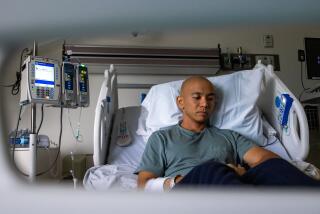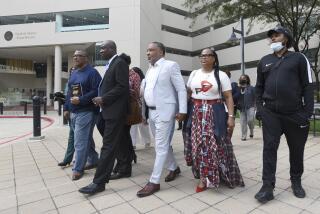Baby Girl’s Bone Marrow Transplanted Into Sister : Health: Parents conceived the child in an attempt to provide a donor for leukemia-stricken sibling.
- Share via
In a dramatic, long-awaited procedure, doctors at the City of Hope National Medical Center transplanted bone marrow Tuesday from a 14-month-old girl into her 19-year-old sister, who has leukemia.
National media crews crowded the front patio of the modern hospital complex in Duarte during the double procedure in which baby Marissa Eve Ayala’s marrow was extracted and then transplanted into her sister Anissa.
The Ayala family of Walnut captured worldwide attention last year when the girls’ parents announced they had conceived their younger daughter in a desperate attempt to save Anissa’s life. A national search had failed to find a compatible marrow donor for Anissa, who is suffering from chronic myelogenous leukemia.
The leukemia is a malignant cancer of the bone marrow and lymph nodes that usually strikes adults. Bone marrow produces red and white blood cells, including the cells of the immune system, which protect against infections.
Charlie Mathews, a City of Hope spokesman, said the transplant took place with no complications. But he would not provide details about either sister’s condition. Members of the Ayala family were not available for comment.
Though medical experts say other parents have conceived to provide donors for ailing children, the Ayalas apparently are the first family to publicly announce such a decision. To prepare Anissa for the transplant, physicians first had to destroy her own bone marrow, which was diseased with the abnormal white blood cells characteristic of her form of leukemia. If this had not been done, the abnormal cells would have regrown, defeating the purpose of the transplant.
Anissa was admitted to the hospital 15 days ago and began receiving intensive radiation therapy to destroy the cancerous cells. On Saturday, she underwent chemotherapy, a process that can cause pain and nausea.
On Tuesday morning, Marissa was given a general anesthetic and a needle was inserted into her hipbone to extract marrow. Doctors say the extraction process usually takes 20 to 30 minutes and causes pain to the buttocks for several weeks, but usually there are no long-term side effects.
The extracted marrow, combined with umbilical cord blood collected and frozen when Marissa was born April 3, 1990, was dripped into Anissa’s veins in a process that usually takes several hours and is similar to a blood transfusion. Cord blood was used because it has a high concentration of so-called stem cells, which help regenerate marrow.
The donated marrow cells will travel through the bloodstream into the bones, where, doctors hope, they will grow and rebuild Anissa’s immune system.
Anissa is expected to remain in the hospital for at least seven weeks, initially in isolation to minimize her risk of developing a life-threatening infection, Dr. Stephen Forman, director of hematology and bone marrow transplantation at City of Hope, said last week. Doctors would not comment after Tuesday’s procedures.
Marissa was to stay in the hospital overnight and, barring complications, go home today. Doctors said her marrow will be fully replenished within two weeks.
Forman, who heads a team of 12 doctors who will monitor Anissa daily, said 72% of patients with her type of cancer recover after getting marrow from a perfectly matched donor, as Marissa was. Recovery is defined as survival for two years. Patients who survive for two years have a 95% chance of complete cure, he said.
On Monday morning, parents Abe and Mary Ayala said they were apprehensive but hopeful as they took Marissa to City of Hope’s pediatric unit for a checkup and visited Anissa in her hospital room.
“Anissa will be reborn,” said Abe Ayala, 47, who owns a speedometer repair business. “The doctors are amazed she’s doing this well.”
“Anissa’s really hanging in there,” added Mary Ayala, 44. “She has a lot of faith God is going to deliver her from this.”
Anissa, who enrolled in Mt. San Antonio College in Walnut last fall and became engaged to be married in February, had seemed in stable health and exercised regularly, her mother said. But with her type of leukemia, it was possible her condition could have taken a sudden turn for the worse, and doctors determined that the transplant should be done Tuesday.
Doctors said a transplant is best done when the donor is at least 6 months old. But they have been performed using younger infants; two years ago, a 6-week-old infant donated marrow at UCLA’s Center for the Health Sciences. Forman said the procedure has proved successful so far.
Some medical ethics experts criticized the Ayalas’ decision to have Marissa. They raised the possibility that couples having a baby for the same reason could test the unborn fetus’ tissue and, if it did not match, abort. In addition, they said it was troubling that a baby could not refuse to be a donor.
Ethicists also warned that the donor, in later years, could be psychologically impaired whether the transplant was successful or not.
But the Ayalas dismissed the controversy, saying they would love their baby no matter what happened.
Before they decided to have a child, the Ayalas tried to find a donor through the National Marrow Donor Program, a St. Paul, Minn.-based organization that matches potential donors and patients. But there only is a 1-in-20,000 chance that two unrelated people have the same marrow type, and the Ayalas’ efforts were fruitless.
Siblings with the same biological parents, however, have a 25% chance that their marrow will match. Neither the Ayalas’ son Airon, 20, nor other family members matched Anissa’s marrow. But prenatal tests indicated that Marissa’s tissue would almost certainly be compatible with her older sister’s.
When they decided to conceive, Abe Ayala had to undergo a vasectomy reversal operation, and doctors warned the procedure might not work. But six months after the reversal, Mary became pregnant.
“The Lord has blessed us in all these ways,” Mary Ayala said last week. “There’s always the chance that maybe (Anissa) won’t make it but yet I’m confident that everything will go OK. This is the last big major step we have to take.”
Times medical writer Robert Steinbrook contributed to this story.
More to Read
Sign up for Essential California
The most important California stories and recommendations in your inbox every morning.
You may occasionally receive promotional content from the Los Angeles Times.












